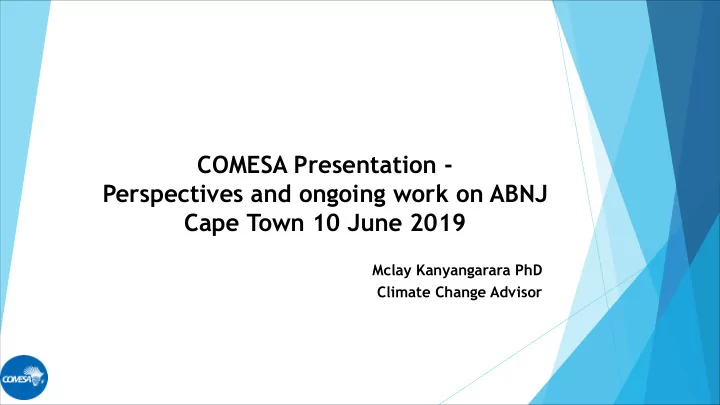

COMESA Presentation - Perspectives and ongoing work on ABNJ Cape Town 10 June 2019 Mclay Kanyangarara PhD Climate Change Advisor
Presentation outline Brief history of the Organization Mandate of the Organization Geographical coverage Highlight of the Organization’s protocols/policies on ocean governance Key programmatic interventions related to coastal and marine resource management Partnerships including potential collaboration with Nairobi Convention Challenges and opportunities Future direction
Brief history of COMESA COMESA is the acronym for the Common Market for Eastern and Southern Africa COMESA started 1981 as the Preferential Trade Area for Eastern and Southern Africa (PTA) December 1994 COMESA was formed to replace PTA. It is Headquartered in Lusaka, Zambia
Mandate of COMESA The mandate of COMESA is to promote economic prosperity through regional integration. Its mission is: To provide excellent technical services to member States to facilitate the region’s sustained development through economic integration.
Mandate of COMESA Cont’d To successfully deliver on this mandate, COMESA has established 10 institutions: Africa Leather and Leather Products Institute (ALLPI) 1. African Trade Insurance Agency (ATI) 2. COMESA Business Council (CBC) 3. COMESA Competition Commission (CCC) 4. COMESA Court of Justice (CCJ) 5. Federation of National Associations of Women in Business in Common Market for Eastern 6. and Southern Africa (FEMCOM) Regional Investment Agency (RIA) 7. Trade and Development Bank (TDB) 8. PTA Reinsurance Company (ZEP-RE) 9. COMESA Monetary Institute (CMI) 10. COMESA Clearing House 11.
Geographical coverage COMESA has 21 Member States - Burundi, Comoros, Djibouti, D.R Congo, Egypt, Eritrea, Ethiopia, Eswatini, Kenya, Libya, Madagascar, Malawi, Mauritius, Rwanda, Seychelles, Sudan, Somalia, Tunisia, Uganda, Zambia and Zimbabwe The COMESA region has a population of 540 million and global trade in goods worth US$ 235 billion. COMESA covers a geographical area of 12 Million sq km
COMESA protocols/policies on ocean governance COMESA seeks to promote attainment of sustainable economic growth and development. This is addressed in Various articles of its founding Treaty : Article 6 - Fundamental Principles guiding COMESA Article 88 - Maritime Transport and Ports 88(o) inter-link Member State national communication systems so as to identify polluted points in oceans for concerted regional marine pollution control; Article 89 - Inland Waterway Transport Articles 122, 123 - promote cooperation and sustainable utilization of natural resources. Article 124 cooperation in the Management of the Environment, specifically through prevention of pollution of water resources Article 127 develop a comprehensive plan for the development of applied sciences related to, inter alia, Oceans.
Key programmatic interventions related to coastal and marine resource management 1. Program to Promote Regional Maritime Security (MASE) To break the financial networks of pirates and their sponsors to • decrease economic impact of piracy in the Eastern and Southern Africa and Indian Ocean Region 2. COMESA Climate Change Programme Supports member states to adapt to and mitigate the impacts of • climate change
Partnerships COMESA recognises the pivotal role of Regional Economic Communities in promoting ocean governance within their areas of jurisdiction to spur economic growth of their respective member states. Therefore, COMESA will be seeking to build a partnership with UN Environment, GEF , UNDP and others on the following thematic areas: Strengthening regional capacity building in order to present a a) coherent and harmonized approach to developing blue economy and climate change statistics. Strengthen national capacity building on data assessment and b) appropriately designed tools for data collection Ensure regional monitoring of the development of BE and CC statistics c) is established .
Challenges and opportunities CHALLENGES Lack of adequate financial resources Limited human resources capacity in the region The destruction of maritime ecosystems, pollution or climate change, as well as poverty or maritime insecurity caused by terrorism or piracy. OPPORTUNITIES Ø To achieve the provisions of the COMESA Treaty on protecting the blue economy and promoting sustainable development, COMESA is desirous to collaborate with like minded institutions like UNEP , UN Environment and other cooperating partners . Ø Development of the COMESA Climate Smart Fisheries and Aquaculture Programme
Future direction Although marine/blue economy is a relatively new concept in the region, its components are embedded in various policies and programmes of COMESA and member states. It is actually a cross cutting issue There is need to quantify the importance and potential contribution of this sector through generation of appropriate statistical data Need to elaborate a holistic approach to the development of this sector given its growing importance and challenges posed by climate change, environmental degradation, misaligned and inadequate policies Hence the need for COMESA to partner with others to build capacity for countries to ensure harmony and coherence in marine development so as derive maximum benefit from their resources Work with the AUC and other RECs for an all inclusive Africa Marine Ocean Governance Strategy
Email: mkanyangarara@comesa.int Thank you for your Kind attention!
Recommend
More recommend